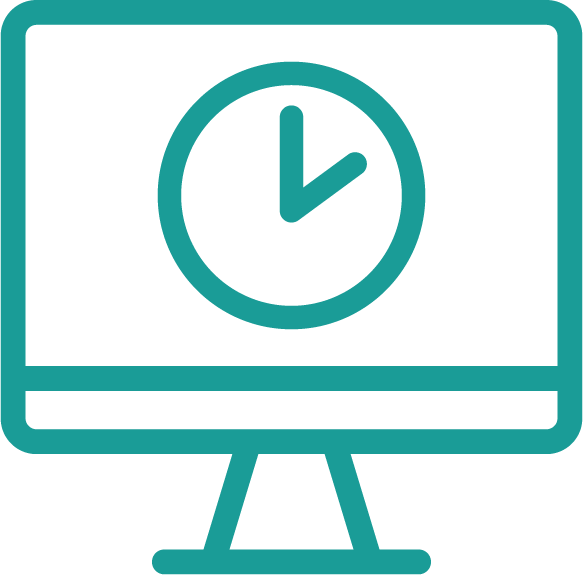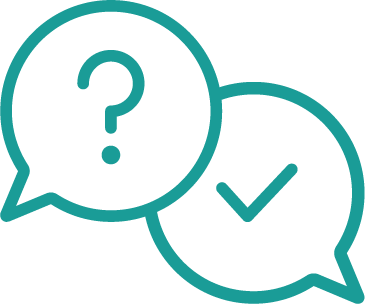Overview
This training prepares learners to sit for both the American Association of Psychiatric Technicians Level 1 certification exam and the Certified Electronic Health Records Specialist exam from the National Healthcareer Association.
Program Timeline
Learners have 12 months of access to complete their program. 10 hours of dedicated training each week is recommended to complete your training before access expires.
12 months of program access
 Self-paced learning
Self-paced learning
Training Format
All our programs are built with flexibility in mind—and to accommodate busy schedules. You can train wherever and whenever you like, so long as you have access to a computer and a wi-fi connection.
Learn from home (or anywhere)
Study online (anytime)
Support
You’re not in this alone. We’ll be by your side from sign-up all the way through completion. If you run into any issues along the way, our Learner support teams will help you troubleshoot the issue so you can get right back in the game.
 1:1 support
1:1 support
![]() Phone, live chat, and email
Phone, live chat, and email
Behavioral Health Technician Training Courses
Our Behavioral Health program is divided into 14 courses, which cover topics including HIPAA standards, pharmacology basics, career-readiness skills, and patient education.
Program Orientation: Behavioral & Psychiatric Technician
- Initiate the Behavioral Health Technician program.
Fundamentals of HIPAA
- Describe the basic requirements of HIPAA.
- Understand the HIPAA Privacy Rule.
- Understand the HIPAA Security Rule.
- Describe the HITECH Act.
- Explain Regulations for Business Associates.
- Summarize HIPAA Documentation and Training.
- Review Applied HIPAA Security for Healthcare Professionals.
Communication and Customer Service
- Identify the various types and styles of communication used in a healthcare office.
- Review how verbal, non-verbal, and written communication skills contribute to patient experience and outcome in a healthcare office.
- Identify professional communication techniques for a healthcare office, including interviewing techniques and use of medical terminology and patient-accessible language.
- Explore modified communication for patients with special considerations.
- Outline protocols for providing customer service for a healthcare office.
Patient Care Coordination and Education
- Review how to administer and coordinate general patient care according to professional best practices.
- Explore the role and responsibilities in administering patient care.
- Explore the role and responsibilities in facilitating patient education.
- Summarize basic communication best practices and potential barriers to effective communication with patients.
Comprehensive Medical Terminology
- Analyze how medical terms are built using common word parts
- Properly spell, define, and pronounce medical terms associated with each of the major body systems
- Identify and define the word parts most frequently associated with the major body systems
- Interpret common abbreviations used in medical terminology and cautions to remember when using them
Pharmacology Basics
- Identify the classifications of drugs.
- Review indications, side effects, and adverse reactions of various classifications of drugs.
- Interpret accepted abbreviations used in reference to medications.
- Explain how to use drug reference guides.
- Describe the rights of proper drug administration.
- Describe the routes of administration for medication.
- Explain how to prepare and administer the most common types of medications.
- Identify the four steps of pharmacokinetics.
- Explore the guidelines for sending orders for prescriptions.
- Calculate correct dosage of medication for administration.
- Convert between household and metric systems of measurement.
- Identify commonly used abbreviations in medication dosage calculation.
Infection Control
- Review the causes and diagnostic methods of various infectious and communicable diseases.
- Explore the protective measures required to prevent infection.
- Outline the treatments and protective measures required to manage and control the spread of infectious disease.
- Identify procedures and protocols for responding to infection control.
Testing and Laboratory Procedures
- Identify how specimens are collected and handled.
- Explore procedures and processes used in obtaining blood and urine samples.
- Outline the standard components of vision and hearing screening tests.
- Review common techniques and processes frequently used in medical laboratories.
Medical Administrative Assistant
- Describe the differences between common healthcare delivery models.
- Describe the types of services typically offered in medical offices, including general and specialty services.
- Define ancillary services and alternative therapies.
EKG and Cardiovascular
- Identify the basic anatomy of the heart.
- List the steps needed to ensure proper functioning of ECG/EKG equipment (calibration, standardization).
- List the equipment and supplies needed to perform an ECG/EKG procedure.
- Identify the placement of standard limb leads and precordial (chest) leads on a patient undergoing an ECG/EKG procedure.
- Identify waveforms, intervals, and segments in EKG/ECG readings.
- Identify artifacts, signal distortions, and electrical interference in EKG/ECG readings.
- Describe ways to minimize artifacts during EKG/ECG readings.
- Describe abnormal or emergent ECG/EKG results, including arrhythmia and dysrhythmia.
Comprehensive Electronic Health Records
- Explain the importance of clinical standards in the development of interoperable electronic health records.
- Demonstrate an understanding of how electronic health records are used in physician practices and other outpatient settings.
- Demonstrate an understanding of how electronic health records are used in hospitals.
Advocacy, Mentoring and Empowerment
- Describes our assumptions about human behavior and social organizations.
- Establishes a set of specific goals or outcomes based on the underlying assumptions.
- Describes the worker’s actions to achieve the specific goals.
- Engage in critical thinking related to the helping profession, social work practices and provide an analysis of quantitative and qualitative research methods and research findings.
- Demonstrate an understanding of the worker-client therapeutic alliance and the utilization of empathy when interacting with clients.
- Gain insight and look at the complexity of the human communication process in social work.
- Learn about appropriate intervention strategies based on the assessment, research knowledge, and values and preferences of clients and constituencies and how to select and use appropriate methods for evaluation of outcomes.
- Demonstrate and verbalize and understanding of the Model of the Work Phase as a mode for understanding the dynamics of practice with clients over time.
- Define and understand the Stages of Ending (Kubler-Ross, Schwartz), Denial. Indirect and direct expressions of anger, Mourning, Trying it on for size, The farewell-party syndrome.
Psychology and Psychiatric Disorders
- Develop a working knowledge of the content domains of psychology.
- Identify key characteristics of major content domains in psychology (e.g., cognition and learning, developmental, biological, and socio-cultural).
- Analyze scientific reasoning to interpret behavior and distinguish normal behavior from abnormal behavior.
- Incorporate several appropriate levels of complexity (e.g., cellular, individual, group/system, and society/cultural) to explain behavior.
- Interpret, design, and conduct basic psychological research and describe research methods used by psychologists including their respective advantages and disadvantages.
- Use scientific reasoning to interpret psychological phenomena and identify basic biological, psychological, and social components of behavioral explanations (e.g., inferences, observations, and operational definitions and interpretation).
- Incorporate several appropriate levels of complexity (e.g., cellular, individual, group/system, and society/cultural) to explain behavior.
- Develop a working knowledge of the content domains of psychology and identify key characteristics of major content domains in psychology (e.g., cognition and learning).
- Apply ethical standards to psychological science and practice and discuss relevant ethical issues that reflect principles in the APA Code of Ethics.
Program Completion
- Prepare to take the next steps after program completion.
Psychiatric and Behavioral Health Technician Certifications
CareerStep’s online Psychiatric and Behavioral Health Technician training covers the knowledge and skills you need to successfully sit for industry-recognized certification. We want to support our learners in securing the certification that fits based upon your career goals and current job requirements. Your program includes up to two different exam vouchers for the certifications below relevant to your training — a significant value add of several hundred dollars.
American Association of Psychiatric Technicians Level 1
The AAPT-Level 1 is a voluntary national certification exam to test knowledge of psychiatric technology — certified by the American Association of Psychiatric Technicians. The level 1 exam has questions concerning basic areas of nursing, medical terminology and mental illness.
Certified Electronic Health Records Specialist
Demonstrate you have the Electronic Health Record skills with the CEHRS from the National Healthcareer Association.
Documents
Ready to Get Started?
Call (800) 411-7073
to speak with a career advisor

